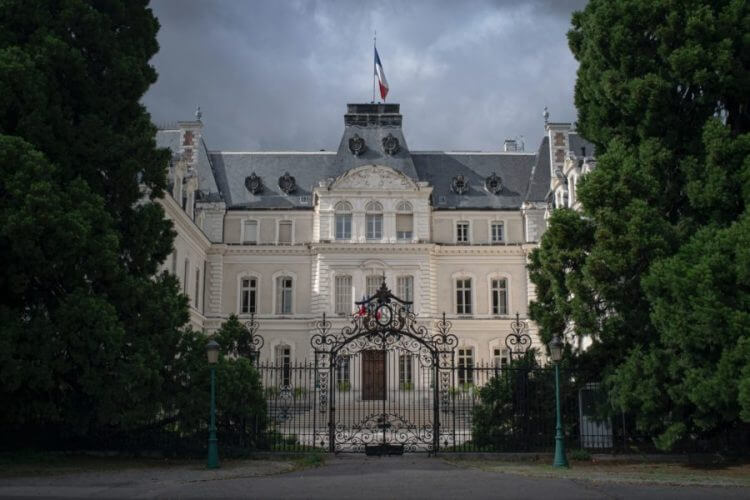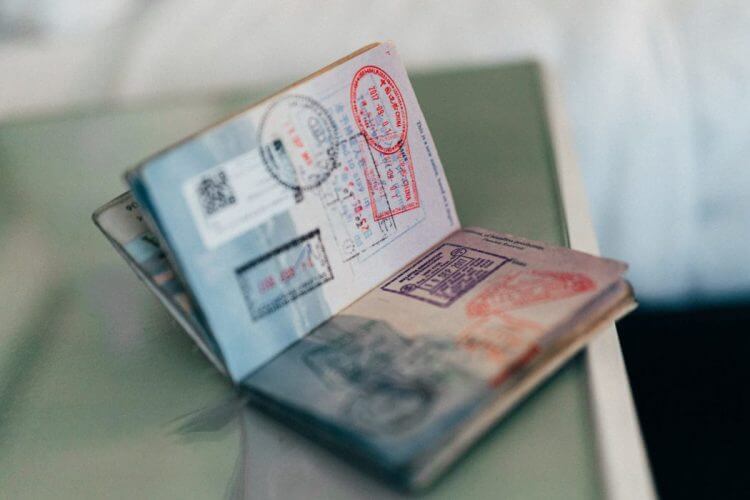Did you know there are 28 French visa types available to move to France?
These are 28 opportunities to make your dream of moving to France a reality!
These 28 long-stay visas are divided into 4 main categories:
- the study visas
- the family visas
- the non-work visas
- the work visas
First, you might be wondering if you need a visa for France.
Which one you would need? Let me give you a short presentation of each long-stay visa available to help you make your decision with confidence.

Table of Contents
Who needs a visa for France?
Depending on your nationality, you might be exempt from requesting a short-stay visa (under 90 days). The France visa wizard will help you confirm your situation.
Also, all EU citizens can come and move to France without needing a visa. This is applicable even to work or study whatever the duration.
If you are a non-EU citizen coming for more than 90 days, you will need to request a long-stay visa. The type you choose will be based on the reason for your move.
The French immigration laws are outlined in the Ceseda (Code de l’Entrée, du Séjour et du Droit d’Asile). The Ceseda applies to all nationalities in the same way. Some countries have a specific bilateral agreement with France. This means that may have some specific rules, depending on the visa.
Putting aside the working holiday visa agreements and young professionals visas, all the bilateral agreements France signed will apply to Maghreb countries and African Sub-Saharian countries.
This means that whether you are from, for example, American, Australian, Indian, British, or Canadian, the Ceseda visa rules explained below will apply in the same way.
This article only applies to long-stay visas. So, if you are coming for more than 90 days in France, you will need to find out which French visa type matches your situation. That way, you will put all the chances of visa approval on your side.

What is the difference between a visa and a residency permit?
There is often confusion between these two terms that lead to confusion with the French administration.
A visa is a sticker or a stamp authorising your entry into a country. It can only be requested outside France at the French Consulate of your current country of residence.
A visa only authorizes entry but not residence or work.
Once you arrive in France, you need to request a permit (or validate your visa) to be staying legally in France.
Which French visa type do you need?
The study French visa types 1
The study visa category gives four different study visas to come to France. It will vary depending on the type of studies you are going to do and also your situation. This is a French visa type that many people choose as a starting point. Studying in France will facilitate their integration into the French job market and get a work permit.
School-aged minor visa (visa Mineur scolarisé)
This visa is for under-aged children coming to France without their parents or with a specialized organization.
Trainee or young professional in training (visa stagiaire)2
This French visa type is for trainees coming to France under the following situations:
1° To carry out an internship in a company, as part of a training program organized in your country of residence. The internship must be part of a school or university curriculum, a vocational training program or a European Union or an intergovernmental cooperation programme.
2° As an employee of a company established abroad to follow a training course provided by an organization, and to complete an internship in a company with which your employer has business relations;
3° To complete a training period in a public health institution to benefit from additional training leading to the recognition of a level of professional qualification.
Student (visa étudiant)
This French visa type will apply to you if you come to France to study at a higher education institution.
To request a student visa, you must
- Be registered (or pre-registered) in a public or private higher education or initial training establishment (university, grande école, etc.); or in a higher professional training organisation.
- You must have at least €615 per month staying in France (so a minimum of €7,380 for one year), with some exceptions.
Please note: if you come to France to take a competition or an entrance exam in higher education, you should apply for a short-stay student-competition visa.
Transition between study and work (Recherche d’emploi, création d’entreprise)
If you have graduated with a French diploma, this visa allows you to stay in France for 12 months. It grants you the right to work for one year even before you find your first job to sponsor your permit!
This visa also applies to Talent-Passport Researcher visa holders when their hosting convention is not renewed.
I have written a specific post about this transition visa, that you can read here.

The family French visa types3
The family visas are granted based on your personal situation.
If you are related to a French citizen (either a French spouse or a French child), this visa will always overwrite the other situations. So for example, if you are married to a French citizen and are moving to France to work, you will have the possibility to request a French spouse visa.
The French spouse visa (visa Vie Privée et Familiale)
This visa is granted to a married spouse of a French citizen. It also applies if you are united via a French civil union (PACs) for a minimum of one year.
Note, that it is a right by law to reside in France as the married spouse of a French citizen. However, the civil union doesn’t grant that right from a legal point of view but helps to receive the visa.
Also, note that the French immigration law doesn’t recognize Defacto relationships.
This visa gives the authorisation to work and/or study in France.
I have written a specific post about the visa Vie Privée et Familiale, that you can read here.
Parent of a French citizen (visa Vie Privée et Familiale)
If you are the parent of a French child and providing that you exercise even partial parental authority over your French child you can also request a Vie Privée et familiale under the motive of being the parent of a French citizen.
This visa gives the authorisation to work and/or study in France.
The family reunion (visa Vie Privée et familiale via procédure de regroupement familiale)4
This specific process will apply to you and your family if you are already in France and your spouse and children want to join you later on.
Both your family members and yourself should be non-EU citizens.
This is a very lengthy process. It can be initiated after you have resided in France legally for a minimum of 18 months.
This visa gives the authorisation to work and/or study in France.
I have written a specific post about the family reunion process, that you can read here.

Relative of an EU-citizen (visa membre de la famille d’un citoyen de l’Union Européene)5
If you are a family member of a European citizen, you can accompany or join them in France. If you are European yourself, a residence permit is not required.
The spouse or descendants under the age of 21 or dependent are exempt from requesting a work authorisation if the person you are accompanying or joining has been admitted to the French labour market for a period equal to or greater than 12 months on the date of their State’s accession to the European Union or afterwards.
The non-work French visa types
The non-work visas are for tourists, retirees, family or private visits or even business trips and volunteering.
Visitor visa6
The visitor visa will apply to you if you do not intend to work in France. This is in the sense of having an employment contract in France or creating a company in France. You could be, for instance, an annuitant, a long-term tourist, a second-home owner or coming to France to visit family or other personal reasons.
I have written a specific post about long-stay visitor visas, that you can read here.
Retiree visa (visa retraité)7
This visa is very similar to the visitor visa. As a retiree receiving a contributory old-age pension, under your own right or derived right, you can request the retiree visa.
This visa does not authorise to work in France.
Your spouse can request the visa retiree spouse (conjoint de retraité). This visa will confer the same rights and will not authorise to work in France.
The work French visa types
Employee (Salarié)
The employee visa is the most delivered French work visa.
To request this visa, you need to find a job in France with a permanent contract (CDI) and your French employer will need to request an authorisation to work from the Labour Ministry (from the DREETS, previously called the DIRECCTE). This means that your employer will need to sponsor your visa and prove that a French or EU citizen cannot perform the job (unless it is a job with many vacancies) and your employer should also pay a tax.
Once you have the work authorisation you will be able to request the visa at the French consulate of your country of residence.
For more details on this visa, see my other post about the 6 French work visas.
Temporary Worker visa (visa travailleur temporaire)
This French visa type is equivalent to the Salarié visa but for employees with a temporary work contract. Same as the previous visa, the French employer will need to sponsor your visa, prove that an EU or French citizen couldn’t be recruited for the position and pay the tax.
For more details on this visa, see my other post about the 6 French work visas.
The seconded – Intra Company Transfer visa (visa Salarié détaché)
The Intra-Company Transfer or ICT visa has been created for employees already employed by a company abroad with a 6-month seniority minimum who wishes to be transferred to their French entity for a limited duration (up to 3 years).
No work authorisation from the DREETS is required and your spouse and children have access to the facilitated visa request to join you in France.
For more details on this visa, see my other post about the 6 French work visas.

The Entrepreneur Visa (visa Entrepreneur Profession Libérale)
If you are an entrepreneur or plan to start your business in France, the visa Entrepreneur Profession Liberale is my favourite entrepreneurial French visa type!
You will need to have a thorough business plan and a 3-year financial projection in addition to the usual administrative paperwork.
Once in France, you will need to register your French company to allow you to pay the relevant social contributions and taxes.
By the end of year one in France, and to get the multi-year permit, you will need to prove that your profits exceeded the French minimum wage over the full year.
For more details on this visa, see my other post about the 6 French work visas.
Jeune Au Pair8
If you are hosted temporarily by a family in France in exchange for light housework and childcare, you can apply for this French visa type. You must meet certain conditions, such as being between 18 and 30 y.o. and signing an agreement with your host family.
The monthly pocket money for Au Pair is €320 minimum.
Working holiday visa for young eligible nationals (Vacances-Travail)
The working holiday programmes are for young people aged between 18 and 30 (35 for Argentina, Australia and Canada) who wish to go abroad (or come to France) for a maximum of one year for tourism and cultural purposes in one of the partner countries. This visa gives you the possibility of working on a secondary basis, without prior approval from the French administration.
The framework of this specific programme is specified, by bilateral agreements that France has concluded with sixteen countries or territories (to date): Japan, New Zealand, Australia, Canada, South Korea, Russia, Argentina, Hong Kong, Chile, Colombia, Taiwan, Uruguay, Mexico, Brazil, Peru and Ecuador (from 2022 for Ecuador).
The Talent-Passport French visa types9
The Talent-Passports are specific work visas. Eleven different Talent-Passport visas shouldn’t be confused with each other since they have different conditions and obligations.
The three points in common that they all share are:
- the Talent-Passport visa holders are exempt from requesting a work authorisation from the DREETS as this is the case for all the other work visas seen above.
- the Talent-Passport visa holder’s spouse is granted a Talent-Passport – Family visa that authorises the spouse to work without any type of restriction.
- the talent-Passports are granted a multi-year permit (up to 4 years) from the arrival in France.
Now let’s see which are the 11 Talent-Passport visas.
EU Blue Card (Carte bleue Européenne)
This is a visa for top-level income talents that do not fall under the other Talent-Passport specific skills and profiles (such as researchers, renowned artists, champions,…).
To apply for an EU Blue Card visa, these are the main criteria you should meet:
- Hold a higher education degree (minimum 3 years) OR five years of professional experience in a specific field.
- Receive a gross annual salary (before bonuses) of a minimum of 1.5 times the referential average gross reference salary: which means a total of € 53 836.50 in 2022 (as an FYI, it has remained the same since 2016).
- Have a one-year work contract minimum.
For more details on this visa, see my other post about the EU Blue Card.
Skilled employee visa (Salarié qualifié)
This visa is a bit similar to the previous one with a slightly lower income threshold and for French diploma holders only.
The main criteria to apply for a skilled visa are:
- Hold a French diploma: Licence Professionnelle or Masters.
- Receive a gross annual salary (before bonuses) of a minimum of € 38,475 in 2022.
- Have a minimum three-month work contract or more.
Expatriate assignment (Salarié en mission)
The Expatriate assignment French visa type has been created for employees already employed by a company abroad who wish to be transferred to France for a limited duration (up to 4 years). Opposed to the Intra-Company Transfer visa described above, this visa requires having a French work contract.
To get this employment visa you should:
- Have an executive role or bring specific expertise
- Hold a work contract with the French entity
- Have more than 3 months of seniority in the company before the transfer to France.
- Receive a gross annual salary (before bonuses) of a minimum of 1,8 times the French minimum salary (€ 34 627,32 in 2022).
Researcher (Chercheur)
This visa is for you If you are a researcher and your laboratory has a project with a French laboratory or you have been invited by a French laboratory or University to conduct research and/or teach.
It can also apply to PhD students who hold a French work contract with a French University to finance their studies. (If you are a PhD student without a university work contract, you should request a student visa).
For more details on this visa, see my other post about the Talent-Passport Researcher visa.
Company founder / Entrepreneur (Créateur d’entreprise)
This visa is quite similar to the “entrepreneur/profession libérale” visa.
However, the Talent Passport entrepreneur visa differs from the Entrepreneur – Profession Libérale visa, in these three main points:
- Have a Master’s degree or be able to prove 5 years of professional experience at a similar level.
The Master’s degree can be in any area, not necessarily related to your business.
- Have a minimum of 30k€ invested in your business (from your own resources or borrowed)
- Justify a sufficient level of resources (at least the minimum wage, in addition to the €30,000 investment)
Innovative business project (Porteur de projet économique innovant reconnu par un organisme public)
This is another great Talent-Passport visa to create a business in France. This Talent Passport visa has been created for innovative start-up founders of the Tech ecosystem. It is one of the 3 visas, part of La French Tech Mission Programme, a fast-track procedure to boost France’s economic attractiveness:
Employee of an innovative company (Salarié d’une entreprise innovante)
This is another of the three French Tech Visa for Employees of an innovative company. To meet the criteria to request this visa, you will need to:
- Hold a French work contract with a minimum duration of 3 months with a French company eligible to recruit via the French Tech programme.
- Receive a gross annual salary of at least twice the French minimum wage (38,475 € in January 1, 2022 ).
Business investor (Investisseur économique)
This is the French Tech visa for investors. To meet the criteria to request this visa, you will need to:
- invest at least €300,000 in the French company.
- invest either directly or via a company in which you have at least 30% of the shares.
- own at least 10% of the company in which you are investing in France
- create or project to create or protect jobs within the four years following your investment in the French company.
Company Officer (Mandataire social)
If you are the representative of the company in France in all acts related to the management of the company, before the shareholders, the social partners and third parties, this visa may apply to you if you meet the following requirements:
- 3 months of seniority in an establishment or a company of the same group as an employee or corporate officer;
- Remuneration at least equal to 3 times the annual gross minimum wage, i.e. €57,712.20 as at 1 January 2022;
- His effective appointment as a legal representative in an establishment or company established in France.

Profession artistique et culturelle
The Talent Passport artistic profession visa is for artists, performers and authors of literary or artistic works coming to France to pursue their artistic careers.
Note that the performing arts technicians cannot apply for the Talent Passport artistic profession and should request either a work visa “temporary worker” (visa travailleur temporaire) or a “permanent worker” visa (visa salarié) depending on the type of work contract.
Internationally renowned personality
Certain artists whose reputation is particularly important can also apply for a Talent Passport “renowned artist”.
However, if you are hesitating between the Talent Passport artistic profession and the Talent Passport renowned artist, go for the first of the two, which leaves the least room for interpretation by the administration.
Making the right choice…
… is not always easy but is the start of a better French (bureaucracy) experience and will set you up for a more successful life in France if you plan to stay more than a year.
If you have a question, I’ll do my best to answer in the comments. If you need a more detailed answer, do not hesitate to reach out to plan a 1:1 personalised advice.
Sources:
[1] Student visa: Ceseda Article L313-7
[2] Visa stagiaire: Ceseda Article R426-16
[3] Visa Vie Privée et Familiale: Ceseda Articles L313-11 to L313-13
[4] Family reunion: Ceseda Articles L434-1 to L434-12
[5] Relative of EU citizen: Ceseda Articles R231-1 to R237-1
[6] Visitor visa: Ceseda Article L313-6
[7] Retiree visa: Ceseda Articles L426-8 to L426-10
[8] Au Pair visa: Ceseda Article L426-22
[9] Talent-passport visas: Ceseda Articles L313-20 to L313-22




8 Comments
Katerina
Hello! I am an American citizen, so I can come to France without a tourisit visa for up to 90 days. I already havea job offer proposing a visa through the French Tech process. Am I allowed to apply for that visa directly from France? During that 90 day period? Or do I have to do it from my country of residence?
Mademoiselle Guiga
Hi Katerina,
You can ONLY request a French entry visa (in your case the employee French tech visa):
– from the French consulate in your home country
– from the French consulate in your current country of residence
You are NOT a resident in France under a tourist status (either a short-stay visa or visa exemption).
So in your situation that would be the first option.
Best,
Teri
We are a retired married couple on a guaranteed fixed income that want to move to France. I would like the option to work if possible, but it’s not necessary.
Mademoiselle Guiga
Hi Teri,
There is no visa allowing a side hustle for retirees, unfortunately. The visitor long-stay visa is the one applicable to retirees but does not authorise to work.
Best,
Rashad uddin
I’m refugee in France i need a family reunion visa.
Mademoiselle Guiga
Hello Rashad,
I’m not familiar with the process for refugees, unfortunately. There are associations that will be able to give legal assistance. You will find more information here. The page is translated.
https://www.refugies.info/demarche/606344ef6a31ee0014d996f2
All the best to you and your family!
Marc
Once you have a visa, how long can you be out of the country each year?
Mademoiselle Guiga
Hi Mark,
If your goal is to meet the requirements to be able to request the 10-year residence card or the French passport, periods of absence from French territory are taken into account in calculating the five-year residence requirement, provided that each period does not exceed six consecutive months and does not exceed ten months in total.
Best,